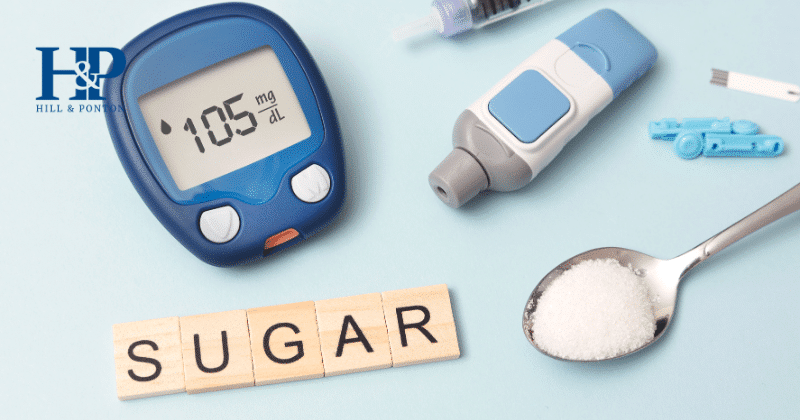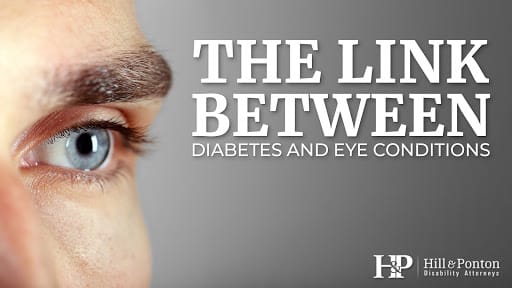Two types of diabetes rated by the VA include diabetes mellitus and diabetes insipidus. Different VA rating percentages are assigned based on the severity of the condition and any related complications. These ratings determine the compensation a veteran and their dependents may receive.
Diabetes Mellitus VA Rating (Diagnostic Code 7913)
- 100%: Requiring more than one daily injection of insulin, restricted diet, and regulation of activities (avoidance of strenuous occupational and recreational activities) with episodes of ketoacidosis or hypoglycemic reactions requiring at least three hospitalizations per year or weekly visits to a diabetic care provider, plus either progressive loss of weight and strength or complications that would be compensable if separately evaluated
- 60%: Requiring one or more daily injection of insulin, restricted diet, and regulation of activities with episodes of ketoacidosis or hypoglycemic reactions requiring one or two hospitalizations per year or twice a month visits to a diabetic care provider, plus complications that would not be compensable if separately evaluated
- 40%: Requiring one or more daily injection of insulin, restricted diet, and regulation of activities
- 20%: Requiring one or more daily injection of insulin and restricted diet, or; oral hypoglycemic agent and restricted diet
- 10%: Manageable by restricted diet only.
VA Notes: Evaluate compensable complications separately unless part of a 100% evaluation. Noncompensable complications are part of the diabetic process. Do not request a glucose tolerance test solely for rating purposes after a confirmed diabetes diagnosis.
Diabetes Insipidus VA Rating (Diagnostic Code 7909)
- 30%: For three months after initial diagnosis. Note: Afterward, rate residuals under the appropriate diagnostic code(s) within the body system.
- 10%: With persistent polyuria or requiring continuous hormonal therapy.
Get Help With Your VA Disability Claim
Is Diabetes a Presumptive Condition?
Type II diabetes is recognized by the VA as a presumptive condition related to exposure to herbicides like Agent Orange. Veterans who served in areas where Agent Orange and other herbicides were used, such as Vietnam, the Korean DMZ, or certain locations where herbicides were stored or tested, are presumed to have been exposed. This presumption simplifies the process for establishing service connection.
Veterans must demonstrate:
- Service in qualifying locations, such as the Republic of Vietnam between January 9, 1962, and May 7, 1975, or near the Korean DMZ between September 1, 1967, and August 31, 1971.
- A diagnosis of Type II diabetes (adult-onset diabetes mellitus).
- A discharge under conditions other than dishonorable.
Because Type II diabetes is presumptively linked to Agent Orange exposure, veterans do not need to prove that their condition was directly caused by their service. This allows for a streamlined process in obtaining VA disability benefits.
How Do I Prove VA Disability for Diabetes?
To qualify for a VA disability rating for diabetes, veterans must present solid medical evidence and prove that their condition is connected to the military service. Here’s how to prove diabetes as a VA disability:
- Medical Evidence: Compile all relevant medical records detailing your diabetes diagnosis and management, including treatments such as insulin therapy, dietary plans, and any hospitalizations.
- Service Connection: Veterans must demonstrate exposure to Agent Orange or service-related conditions directly leading to the development of diabetes. For veterans exposed during service, diabetes is considered a presumptive condition, which simplifies the claims process.
Winning Service Connection for Type II Diabetes and Diabetic Neuropathy: Case Example
In this case, a Vietnam War veteran appealed for higher disability ratings for his service-connected Type II diabetes and diabetic peripheral neuropathy of the lower extremities. The veteran served honorably from May 1969 to March 1971 and was granted service connection for Type II diabetes due to herbicide exposure (Agent Orange).
Initially, he was awarded a 10% rating for diabetes, but after a detailed review of his medical history, the Board of Veterans’ Appeals granted an increased rating of 20%, effective from May 4, 2009, and a further increase in his diabetic peripheral neuropathy ratings.
How This Claim Was Won
- Medical Documentation of Disease Progression: The veteran provided detailed medical records showing that his diabetes required both diet control and medication starting in 2009. Although he had an allergic reaction to some diabetes medications, his hemoglobin A1C levels consistently showed poor control, warranting a higher rating.
- Testimony of Symptom Impact: During the Board hearing, the veteran and his spouse provided crucial testimony about the progression of his symptoms, including visits to the emergency room and difficulty managing his diabetes. Their testimony demonstrated the need for increased compensation due to worsening symptoms.
- Increased Neuropathy Ratings: The Board also found that the veteran’s diabetic neuropathy worsened over time, with consistent evidence of moderate pain, numbness, and tingling in his lower extremities. As a result, the Board granted a 20% rating for diabetic peripheral neuropathy for both the right and left lower extremities, effective from December 4, 2013.
This case highlights the importance of ongoing medical documentation, symptom progression, and clear testimony in securing higher VA ratings for diabetes and its related conditions.
How Can I Increase My Diabetes VA Rating Using Secondary Conditions?
In addition to diabetes itself, veterans may also experience secondary conditions caused by diabetes. These conditions can increase the overall VA rating and compensation a veteran may be able to receive for themselves and their loved ones. Here’s a list of common secondary conditions connected with diabetes.
- Renal Dysfunction/Kidney Issues: Diabetes can lead to nephropathy, affecting kidney function and potentially leading to chronic kidney disease or renal failure.
- Diabetic Peripheral Neuropathy: This involves nerve damage in the extremities, leading to pain, tingling, or numbness, primarily in the hands and feet.
- Erectile Dysfunction (ED): Diabetes may impair blood flow and nerve function, contributing to difficulties in achieving or maintaining an erection.
- Hypertension (High Blood Pressure): Diabetes is closely linked with hypertension, and the latter can exacerbate the risk of diabetic complications.
- Skin Conditions: Diabetes may lead to bacterial and fungal infections, diabetic dermopathy, and other skin conditions.
- Diabetic Retinopathy: This eye condition results from damage to the blood vessels in the retina and can lead to blindness.
- Heart Disease: Diabetes significantly increases the risk of cardiovascular issues, including coronary artery disease, heart attack, stroke, and atherosclerosis.
- Strokes: The risk of strokes is higher with diabetes, particularly due to the potential for blood clots and high blood sugar levels damaging blood vessels.
- Foot Problems: Diabetes can lead to foot ulcers, infections, and even amputations due to poor circulation and nerve damage.
Understanding the VA rating for diabetes and its secondary conditions is the first step to receiving your rightful compensation. If you’re navigating this complex process, remember, you’re not alone. Our resources can help you secure the benefits you’ve earned through your service.




